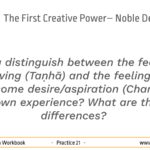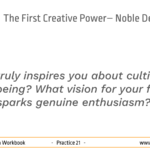Practice 21 – The First Creative Power – Noble Desire
The wholesome desire for freedom
The path is not about forcing yourself into rigid discipline, but about cultivating a heartfelt interest in waking up to life. When you care about your journey, the effort becomes a joy.
Stephen Batchelor
The movement of spiritual awakening is away from grasping and toward openness – toward intention rather than craving.
Tara Brach

Episode 21 – The spark of motivation that powers our raft
An AI generated ‘deep dive’ into this aspect of the RAFT to Freedom
Having surveyed our ‘Four Creative Powers’ that propel us on our journey from suffering to freedom – we now explore the first and arguably foundational Creative Power: Noble Desire or Enthusiasm (Chanda). This isn’t just any desire; it’s the crucial spark, the wholesome aspiration and committed interest that ignites and fuels our entire journey towards freedom from the many ways we lose ourselves and experience suffering.
It is absolutely vital to distinguish the difference in meaning of the Pali words Chanda (desire) and Taṇhā (craving). As Buddhist translators point out, Gotama (the Buddha) spoke of two kinds of desire: taṇhā and chanda, with chanda being essential for our progress on our journey.
- Taṇhā (Craving): Arises from a sense of lack, ignorance, and often delusion. It’s the desperate wanting, grasping, clinging – “I need this to be okay” – that drives the cycle of the many ways we lose ourselves and leads directly to the suffering of pain, difficulties and disappointments. It’s often ego-driven and focused on immediate gratification or escape – reward or relief.
- Chanda (Noble Desire): Arises from wisdom, clarity, and connection to our values. It’s the positive aspiration, the genuine interest, our heartfelt commitment – “I want to heal” – “I aspire to freedom,” – “This path is worthwhile”. Chanda fuels our effort without agitation and is directed towards long-term well-being for ourselves and for others.
The Buddhist monastic Ajahn Sucitto, describes chanda beautifully as:
Desire is an eagerness to offer, commit, apply oneself… It’s a psychological ‘yes,’ a choice, not a pathology. You could summarise Dhamma training (the Buddhist teachings) as the transformation of taṇhā into chanda.
Noble Desire (chanda) is the Creative Power that counters the apathy, hopelessness, resistance, and despair that often accompany the tangle of habits that disconnect us from ourselves. It provides us with the initial motivation to even begin our journey to liberation and the sustained enthusiasm to persevere through challenges. As Stephen Batchelor suggests, it’s about cultivating a “heartfelt interest in waking up to life,” making the effort feel joyful rather than burdensome.
Recognising this potential for wholesome desire within ourselves is part of this first stage of our journey – recognising what it is to be human. We learn to differentiate the painful pull of cravings from the inspiring energy of the ‘Four Resolves’.
In our ‘RAFT to Freedom’ metaphor, Noble Desire is the initial spark that powers our raft. It’s the fundamental desire to reach the safe shore, the clear intention that motivates us to gather materials, build our raft, and embark on the journey. Without this wholesome desire, our raft would remain unbuilt, and we would still be marooned on the dangerous shore.
How to cultivate Noble Desire
Noble Desire keeps us oriented towards our destination. This isn’t about forcing enthusiasm. We don’t passively wait for inspiration, but we actively nurture the fertile ground within ourselves for Noble Desire to naturally arise and be sustained, as we engage with these practices:
- Connect with your ‘why’ (purpose): Regularly reflect on your deepest reasons for seeking this journey to liberation. What kind of life do you truly aspire to? What values are most important to you (for example, freedom, connection, peace, health, integrity)? Visualise this positive future clearly. Consider creating a personal mission statement or a vision board. This deep connection to your purpose transforms the mundane into the meaningful, infusing every stage of your journey with power.
- Set inspiring and achievable goals (suitability): Break down the vast journey into smaller, manageable stages that feel both inspiring and attainable. Frame your goals positively (for example, ‘Cultivate five minutes of serenity breathing daily’ rather than just ‘Don’t fall overboard!’). Achieving small goals builds momentum and reinforces our Noble Desire.
- Focus on the path as growth and discovery (domain): You can approach the path of healing not just as a struggle against harmful compulsions, but as an opportunity for your profound learning, self-discovery, and for developing wisdom and self-compassion. Cultivate a caring curiosity about the process itself. This perspective shifts your engagement from obligation to an inspiring exploration.
- Nurture Interest: Engage with inspiring resources – stories of healing, Buddhist inspired talks, supportive literature, biographies of resilient individuals. Surround yourself with people who embody the qualities you aspire to cultivate. This consistent nourishment keeps the spark of your Noble Desire alive.
- Balance desire with non-attachment (non-delusion): As the Buddhist monk Ajahn Chah advised, “If you pick up something and find it useful, then use it. But don’t cling to it.” You can desire the goal (freedom, well-being) wholeheartedly, but practice letting go of your rigid attachment to specific outcomes or timelines – “I will not suffer for my preferences!’. This prevents your Noble Desire from morphing into stressful striving or disappointment and fosters a balanced and sustainable effort.
Self-reflections
As we cultivate Noble Desire, we often find our relationship with our journey shifts from struggle to an inspiring exploration. Let us explore this transformation together through these reflections:
- Can you distinguish between the feeling of craving (Taṇhā) and the feeling of wholesome desire/aspiration (Chanda) in your own experience? What are the key differences?
- What truly inspires you about cultivating well-being? What vision for your future sparks genuine enthusiasm?
- What makes your journey to liberation feel like a burden or obligation versus an inspiring path?
- Are your current goals for a purposeful life specific, meaningful, and achievable? Do they inspire ‘Noble Desire’?
- How do you typically respond when your enthusiasm or motivation wanes?
- Can you differentiate between the craving that leads to suffering and the ‘Noble Desire’ that motivates positive action?
Journaling prompts
Use your journal to connect with and cultivate Noble Desire:
- Vision of freedom: Write a detailed description of what the ‘safe shore’ looks like for you. Imagine yourself living freely, embodying the qualities you value. What does it feel like? What are you doing? Who are you with? Let this vision inspire your ‘Noble Desire’.
- Connecting to values: List 3-5 core values that are important to you (for example, honesty, kindness, freedom, health, connection). How does your journey to liberation align with and support these values? Write about this connection.
- Inspiring steps: Choose one larger goal for cultivating well-being. Break it down into 3-5 smaller, inspiring, and achievable steps you can take in the coming days or weeks. Write them down as positive resolves.
- Chanda vs. Taṇhā: Reflect on a recent experience of strong desire. Was it primarily Taṇhā (craving, based on lack, leading to agitation) or Chanda (aspiration, based on value, leading to skilful effort)? Describe the difference in feeling and outcome.
- Affirming aspiration: Create 1-3 personal affirmations based on your Noble Desire for cultivating well-being (for example, “I am committed to cultivating peace and freedom,” “I embrace this journey of healing with a caring curiosity and hope”). Write them down and consider repeating them daily.
Supporting material: scientific and philosophical perspectives
To further ground our understanding of Noble Desire, we can look to insights from contemporary science and ancient philosophy, which echo the wisdom of Gotama’s insights:
- Neuroscience: Intrinsic motivation (acting out of inherent interest and value, like Noble Desire) is associated with different neural pathways and more sustained engagement than extrinsic motivation (seeking external rewards or avoiding punishment). While the cycles of becoming driven by taṇhā hijack dopamine pathways related to immediate reward prediction, Chanda likely engages PFC-mediated circuits involved in long-term goal-setting, value-based decision making, and sustained attention. Positive anticipation and hope associated with Noble Desire can also positively modulate mood and resilience networks.
- Psychology: Self-Determination Theory emphasizes that fulfilling innate psychological needs for autonomy (feeling volitional), competence (feeling effective), and relatedness (feeling connected) fuels intrinsic motivation (Chanda). Goal-Setting Theory shows that specific, meaningful, and challenging-yet-achievable goals enhance performance and commitment. Motivational Interviewing techniques focus specifically on eliciting and strengthening a person’s own intrinsic motivation for change, directly aligning with cultivating Noble Desire. Positive Psychology studies the role of purpose, meaning, hope, and optimism in well-being and resilience. Noble Desire aligns with SMART goal-setting principles often used in modern approaches to cultivating well-being.
- Philosophy: The nature of desire is a central topic. Many traditions distinguish between base appetites (epithumia) and rational or virtuous desires (boulesis) aligned with the good (similar to Taṇhā vs. Chanda). Ethics explores the role of right intention and aspiration in guiding action. Concepts of purpose, meaning, and commitment to chosen values are crucial in existential and virtue-based philosophies for motivating a well-lived life.
These diverse perspectives collectively affirm the profound power of Noble Desire as we navigate our journey to freedom.
Remember to remember
Noble Desire (Chanda) is the essential Creative Power, the spark that powers our raft and illuminates our path. By clearly distinguishing it from the painful grip of craving (Taṇhā) and consciously cultivating this wholesome aspiration rooted in our deepest values, we transform the path of healing from a reluctant struggle into an inspired journey of growth and liberation. Recognising our capacity for Noble Desire is a key insight of this leg of our journey. Nurturing this enthusiasm provides us with the foundational motivation needed to engage with the challenges and practices ahead.
Remember to connect with your ‘why’, set inspiring goals, approach the path with curiosity, and balance your desire with wisdom and self-compassion. With this wholesome desire as our guide, we are ready to explore the next Creative Power: the Courageous Energy needed to translate aspiration into sustained action.
As we move forward, we do so together, ignited by this shared Noble Desire, propelling our raft steadily towards freedom.
The Buddha doesn’t recommend getting rid of all desire – only unskillful desire. Without skillful desire, you can’t follow the path.
Thanissaro Bhikkhu
James Allen
You will become as small as your controlling desire; as great as your dominant aspiration.”
RAFT to Freedom © 2025 by Dr Cathryn Jacob and Vince Cullen is licensed under CC BY-NC-SA 4.0. To view a copy of this license, visit https://creativecommons.org/licenses/by-nc-sa/4.0/ |
Sutta references
- Iddhipada-vibhanga Sutta (SN 51.20 – Analysis of the Bases for Spiritual Power): Defines Chanda as the first base for power.
- Summary: Explains the base of power endowed with concentration founded on desire (Chanda) and volition (padhāna-saṅkhāra), indicating that focused desire/aspiration itself is a basis for achieving goals.
- Chandasamadhi Sutta (SN 51.13): Links desire/will directly to concentration.
- Summary: States that concentration gained through desire or will (Chanda) is called concentration due to desire (chandasamādhi), highlighting Chanda as a basis for mental stability.
- Distinction from Taṇhā: While not always explicit in single suttas, the distinction is fundamental to the Four Noble Truths (where Taṇhā is the origin of suffering) and Right Intention (part of the path, aligned with Chanda). Commentaries and teachers frequently elaborate on this crucial difference. Suttas discussing Right Intention (Sammā Saṅkappa, for example, MN 117) – intention of renunciation, non-ill will, non-cruelty – exemplify wholesome desire (Chanda) in action.
- Various Suttas on Motivation: Texts discussing factors leading to exertion or inspiration implicitly touch upon Chanda as the motivating factor.





